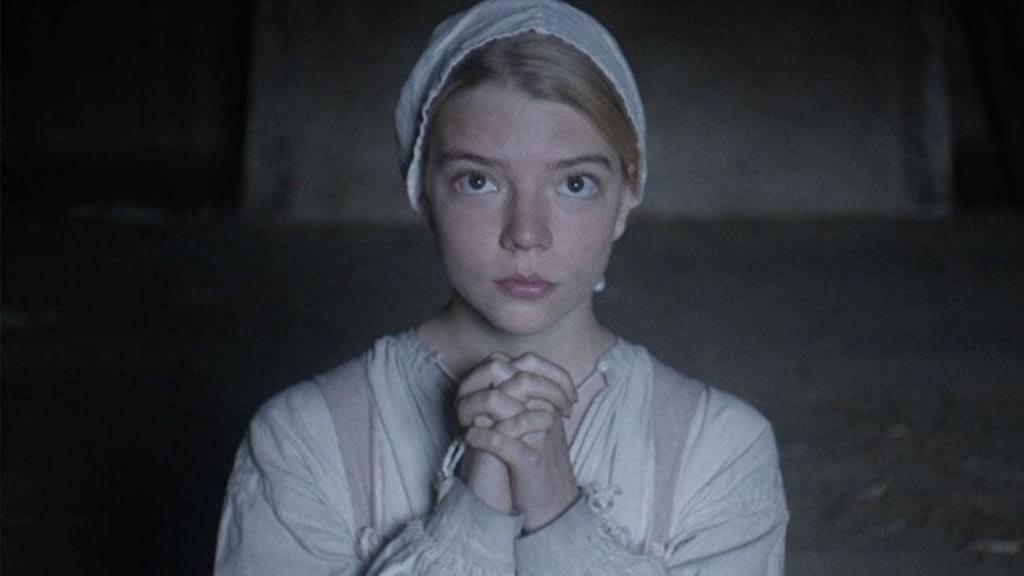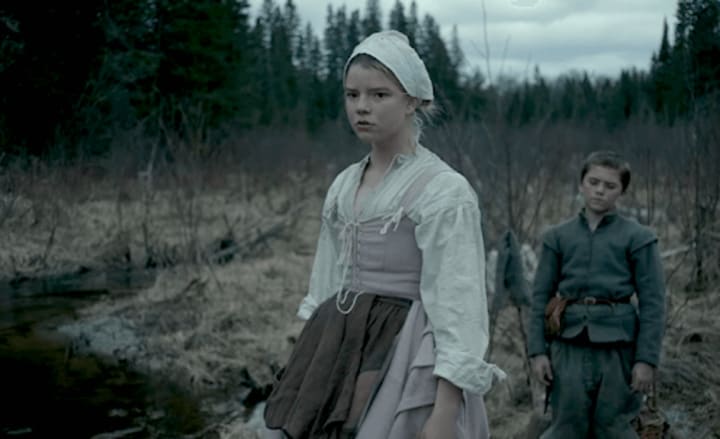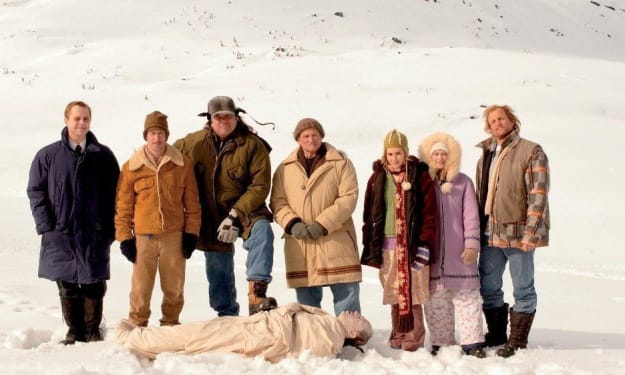"The VVitch": the fall of faith, the abuse of faith
Question/answer

The new director (Robert Eggers), who has repeatedly collaborated with A24, uses thrillers as the motif. Both feature feature films in this genre are based on the subtopics of history, religion, and mythology. The first work in 2015 (The VVitch) is different from many horror genres with religious settings. The latter usually intends to use religion to charm the plot to produce the horror of unknowable/controlling power; the former is based on historical and folklore research. England) District (Puritan) and Salem Witch Trials (Salem Witch Trials, 1692-1693) as a background, trying to elicit dialectics of religious philosophy and historical reflection.
Question/answer
Divide this work into three levels of discussion. First, the micro protagonist is a family, and the audience will soon realize that this is a dialectic of religious philosophy. Excluding the reasons for the tragedies that were believed to have mythological and historical factors at the time, the entire work has repeatedly shown that William (Ralph Inison) used chanting to solve the above-mentioned unknowable problems in order to solve the problems. Introduce the theological view of praying for God's forgiveness and assistance. The continuous overlapping of chanting rituals seems to draw great tension with the dialogue between William and his son Carleber (Harvey Scrimshaw) about faith in the forest: the gods and demons, sin and punishment in William’s mouth have become unexplainable creeds. Implied is the dogmatization of faith. When Callebo tried to inquire about the origin of religion and the theory of evil nature, William's answer undoubtedly stereotyped the image of God, narrowing the special dialectical field that religion originally intended to reach, and reducing it to a congestion that only concerns "correctness." Squeeze the confession room.
William first confuses the difference between faith and belief. The opening with the Botanical Garden reveals that the "correct" Puritan doctrine that William believes in is only in his own mind, and he has a religious disagreement between the Botanical Garden and him ( The movie does not explain the details) only to be reduced to blasphemy. However, the various teachings and suggestions in religious scriptures do not force believers to obey and implement beliefs and implement those long-held “rules”. Rather, they establish belief in the religious worldview and use the religion’s interpretation of the world. Effective argumentation is the premise, and the discussion about faith is launched in the classics. The process and the final arrival are both in-depth exploration of the relationship between the individual and the world, so as to find a possible answer in the fundamental question of man: "Who am I?" That is, when beliefs become beliefs and problems become dogmas, truth will also reduce "correctness."
The paranoia and madness embodied by William and Catherine (Cate Ditch) is undoubtedly a stubborn attitude toward dogma, and it cannot even be called a belief, but a lower-level superstition, which makes it already under the false consciousness of believing in God. The path of blasphemy in disguise.
Second, in the background of Protestantism, all kinds of strange things encountered by the protagonists are also linked to various metaphors in the biblical story. On the animal side, the image of Asmodeus (seven deadly sins) seen frequently by Callebo.
The lust here is not Kaleb’s desire for his sister Thomasin (Anya Taylorjoy). First of all, this desire is more than true lust, rather than just the projection of Kaleb during the period of sexual enlightenment. For a young man living in a devout Puritan family, he knew nothing about sex, coupled with their solitary life, so that he could only project the hopes generated by this learning process into the only young woman at home— —His sister—on the body.

Secondly, in the discussion of the seven deadly sins, lust does not simply refer to sexual desire, but an excessive and immoral desire for something/thing; the black goat that appears in the film constantly and is regarded as related to witches is also lust. One of the representative images. In the end, William’s death by a black goat ironically corresponds to the original sin of lust: the blind worship of gods and Protestants. This also has a subtle relationship with Dante Alighieri's interpretation of lust. In (Divine Comedy, 1555) Dante once stated that one aspect of lust is "too much love for each other, which will devalue God's love for people." . What if today this "other party" becomes God himself?
William's almost paranoid belief in God seems to contradict the above-mentioned excessive admiration. His dialogue with Calleber in the woods is here again. Can the original sin in everyone's heart be washed away only through piety? Does God love the world? Callebo chose to question the end of being seduced by a witch due to his father’s pressure to stop speculation. William was directly hit to death by this "dark crime." Are these tragedies a hint of God’s punishment? The answer speaks for itself.
The pain of wisdom
Third, as far as the image of objects is concerned, starting with the lie that Callebo told his father for his father to cover up the facts, the metaphors on the material aspect of the apple began to ferment in the movie. Familiarly, one of the most famous stories in the Bible: The Garden of Eden, the forbidden fruit is an extremely iconic symbol. The apple in "The VVitch" seems to correspond to the forbidden fruit in the Garden of Eden. In the story of the Garden of Eden, stealing the forbidden fruit is regarded as the original sin of wisdom, or to put it further, wisdom is the original sin of mankind. But we might as well interpret this story from another angle. It is because of the pursuit of wisdom that people understand the death (mortality): after gaining the consciousness of wisdom, they begin to understand their own mortalities, and try to find the individual's in the finiteness of this destiny. Ultimate care is the wisdom pursued in a lifetime.
The above-mentioned overtones respond to the apple in "The VVitch". Calleber’s white lies are still related to the conversation between him and his father in the forest: when he asked his father about God, sin, and other questions, his father’s answer was like banning Adam. Like Eve getting the forbidden fruit (wisdom), it ends all possibilities of enlightenment. William's "protection" led to an even more tragic ending. Calleber could not ask anyone, only up and down in his own ignorance. Moreover, this implies the fate of superstition and ignorance. When William finally took out the apple that plugged Calleber’s mouth, he undoubtedly praised the deep meaning of the forbidden fruit: Calleber’s uncivilized state due to William’s restrictions caused him to be easily deprived. Captured by the temptation of the witch, and in the process of being hunted, he finally understood the original sin and doubts that plagued him-just as the apple pit stuck in his throat when Adam ate the forbidden fruit again became a male throat-it was only his price It was the sacrifice of life, the forbidden fruit of wisdom spit out from the body, and this enlightenment also ended his life.
The above-mentioned three-level interpretations are interlinked and constantly circulating in the works. The metaphors of family, animals or objects all point to the dialogue between William and Calleber hunting in the woods. Using this as an anchor point, we can even extend to the historical issue of the Salem Witch Trial. In that era of supernatural and Satanic talks, all abnormal phenomena will transcend oracles/religious scriptures (white magic) and become concrete images of witchcraft and sorcery (black magic). This is not to accuse the irrationality of the witch hunt as a result of the irrationality of fashion, but that the belief was distorted into a narrow creed at that time. Based on this, the power-holders and people at that time super-translated (or abused) the creed as the only epistemology of all things in the world. As long as there is any phenomenon that cannot be interpreted, it will be tied to the opposite of the pure and noble god-Satan and witchcraft.
William is the epitome of this dualism of gods and demons. At the same time, the William family is also the prototype of the Salem Witch Trial. The two children of the former family members Messi (Ellie Grainger/Ellie Grainger) and Jonathan (Lucas Dawson/Lucas Dawson) and the beginning of the latter's witch hunt-Salem priest Samuel Parris (Samuel Parris) )'S 9-year-old daughter Betty (Elizabeth Parris) and 11-year-old niece Abigail Williams have the same settings. The accusations made by Paris and Abigail at the time were the same as Messi and Jonathan's accusation of Thomasin as a witch in the film. The difference is that in the end Thomasin was not executed, but was sublimated into a real witch.
This sublimation also responds to the Salem Witch Trial. All the women (and a small number of men) accused of being witches were not originally (is) witches, but became (become) witches. Misunderstandings of beliefs, superficial interpretations, and The use of classics as a logical system to make true and false value judgments and arguments has undoubtedly led to this historical tragedy. Those problems such as (Witch’s Cake), (Touch Test) and (Witch’s Marks) that sound absurd now do not lie in the immature scientific method of investigating, but rather the degradation of religion (belief). The infinite order of beliefs leads to the mixing of superstitions, leading to a skepticism that everyone is at risk, and ultimately leading to the collapse of the entire belief system.
Deformation of beliefs
A modern review of the scientific explanation of the Salem Witch Trial is that most of the abnormal phenomena at that time came from the infection of the fungus Claviceps purpurea in rye. However, these rational inquiries may not be the focus of the witch hunt as the trauma of human history. It is a reconsideration of whether contemporary people remember the tragedy of the fall of faith and the consequences of the abuse of faith. "The VVitch" reviews the past religious tragedies in contemporary times. In addition to reappearing the Salem witch trial, it also brings out many problems of belief tradition through the dialectics of religious philosophy. There may be no witch hunts in the contemporary era, but the paranoia of belief still exists, transforming into a lot of fanaticism under the surface. Even though human beings have accepted the enlightenment and scientific rationalization and become a kind of "modern" human beings, the phenomena of superstition and belief/confusion continue to occur and continue to lurking in daily life.
About the Creator
Anton Bolduc
Don't regret it, and don't regret it. The emotion of regret is even more terrible than what you did wrong, because it will destroy your self-confidence, self-esteem, and it is likely to make you do more wrong things.






Comments
There are no comments for this story
Be the first to respond and start the conversation.